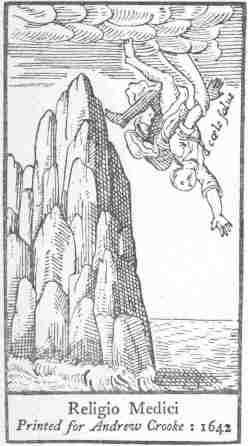Transcribed from the 1898 Oliphant Anderson & Ferrier edition, email ccx074@coventry.ac.uk
SIR THOMAS BROWNE AND HIS ‘RELIGIO MEDICI’: an Appreciation
with some of the best passages of the Physician’s Writings selectedand arranged by Alexander Whyte
D. D.
Oliphant Anderson & Ferrier
Saint Mary Street, Edinburgh, and
21 Paternoster Square, London
1898
DEDICATED TO
SIR THOMAS GRAINGER STEWART
PRESIDENT OF THE BRITISH MEDICAL ASSOCIATION
AT WHOSE REQUEST THIS APPRECIATION WAS DELIVERED AS
THE INAUGURAL DISCOURSE
AT THE OPENING MEETING OF THE ASSOCIATION
IN ST. GILES’ CATHEDRAL ON THE 26TH JULY 1898
IN GREAT GOOD-WILL AND LOVE BY
ALEXANDER WHYTE p. 11
APPRECIATION AND INTRODUCTION
The Religio Medici is a universally recognised English classic. And the Urn-Burial, the Christian Morals, and the Letterto a Friend are all quite worthy to take their stand beside theReligio Medici. Sir Thomas Browne made several other contributionsto English literature besides these masterpieces; but it is on the ReligioMedici, and on what Sir Thomas himself calls ‘other piecesof affinity thereto,’ that his sure fame as a writer of nobletruth and stately English most securely rests. Sir Thomas Brownewas a physician of high standing and large practice all his days; andhe was an antiquarian and scientific writer of the foremost informationand authority: but it is the extraordinary depth and riches and imaginativesweep of his mind, and his rare wisdom and wealth of heart, and hisquite wonderful English style, that have all combined together p. 12toseal Sir Thomas Browne with his well-earned immortality.
Sir Thomas Browne’s outward life can be told in a very fewwords. He was born at London in 1605. He lost his fathervery early, and it must have been a very great loss. For the oldmercer was wont to creep up to his little son’s cradle when hewas asleep, and uncover and kiss the child’s breast, and pray,‘as ’tis said of Origen’s father, that the Holy Ghostwould at once take possession there.’ The old merchant wasable to leave money enough to take his gifted son first to WinchesterSchool, and then to Oxford, where he graduated in New Pembroke in 1626. On young Browne’s graduation, old Anthony à Wood has thisremark, that those who love Pembroke best can wish it nothing betterthan that it may long proceed as it has thus begun. As soon ashe had taken his university degree young Browne entered on the studyof medicine: and, in pursuit of that fast-rising science, he visitedand studied in the most famous schools of France and Italy and Holland. After various changes of residence, through all of which it is somewhatdifficult to trace the young physician’s movements, we find himat last fairly settled in the city of Norwich, where p. 13hespent the remainder of his long, and busy, and prosperous, and honourablelife.
Dr. Johnson laments that Sir Thomas Browne has left us no recordof his travels and studies abroad, and all Sir Thomas’s readerswill join with his great biographer in that regret. At the sametime, as we turn over the pile of letters that Sir Thomas sent to hisstudent son Edward, and to his sailor son Thomas, when they were abroadat school and on ship, we can easily collect and picture
